Top 5 Best Hair Oils for Hair Growth and Thickness
If you've ever run your fingers through thinning hair or watched clumps fall out in the shower, you're not alone. Millions of people struggle with hair loss, slow growth, and lack of volume.
While genetics play a significant role in hair health, the right hair oils can make a remarkable difference in promoting growth and creating the appearance of thicker, fuller hair.
Hair oils have been used for centuries across cultures to nourish scalps, strengthen strands, and encourage healthy growth.
Unlike harsh chemicals or expensive treatments, natural oils work gently with your hair's biology to create optimal conditions for growth. In this comprehensive guide, we'll explore the five most effective hair oils for growth and thickness, backed by both traditional wisdom and modern research.
Whether you're dealing with pattern baldness, postpartum hair loss, or simply want to maximize your hair's potential, understanding which oils work best—and how to use them—can transform your hair care routine and your confidence.
| Rank | Hair Oil | Best For | Price Range |
|---|---|---|---|
| 5 | Jojoba Oil | Scalp Health | $12-30 |
| 4 | Coconut Oil | Budget-Friendly Option | $5-15 |
| 3 | Argan Oil | Overall Hair Health | $15-40 |
| 2 | Castor Oil | Thickness and Strength | $8-20 |
| 1 | Rosemary Oil | Stimulating Growth | $10-25 |
5. Jojoba Oil - Best for Scalp Health
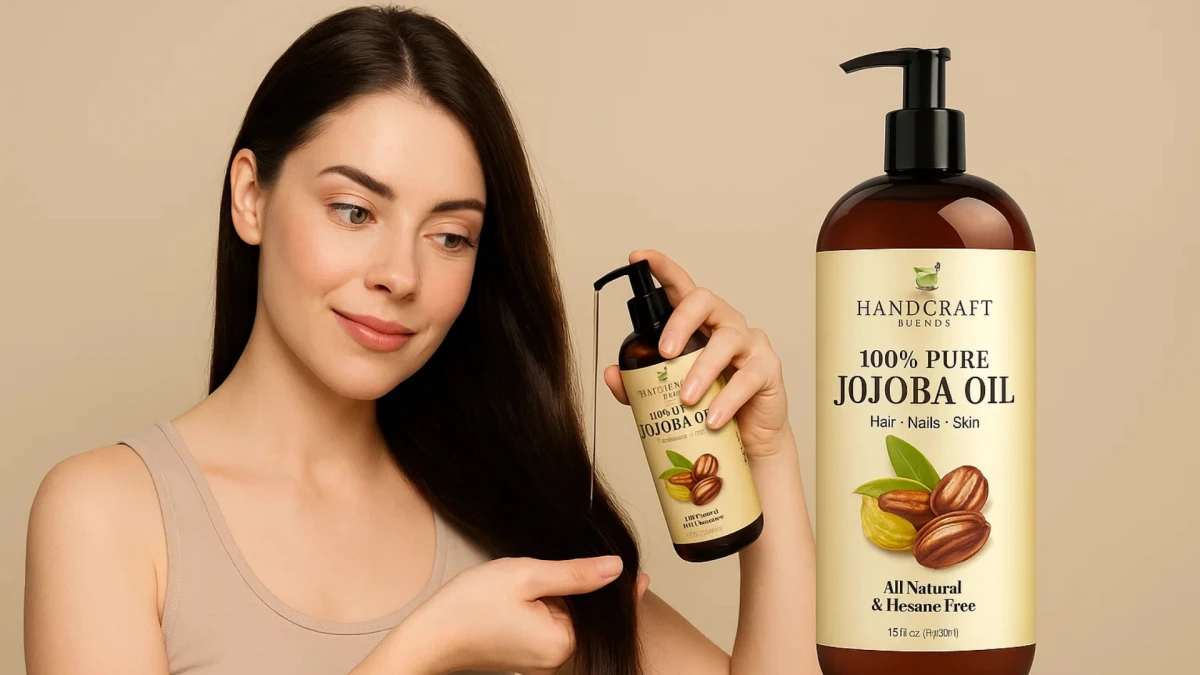
Technically a liquid wax rather than an oil, jojoba closely mimics the natural sebum produced by our scalp. This unique characteristic makes it exceptional for maintaining scalp health—the foundation of good hair growth.
Key ingredients: Jojoba contains wax esters similar to those in human sebum, along with vitamins E and B-complex, chromium, copper, and zinc. It's also rich in myristic acid and has natural antimicrobial properties.
How it works?
Because jojoba is so similar to natural sebum, it doesn't disrupt the scalp's natural balance. Instead, it helps regulate oil production—moisturizing dry scalps while helping to control excess oil on oily scalps.
This creates an optimal environment for hair follicles to function properly.
How to use?
Jojoba can be used pure without dilution. Massage a small amount into the scalp and work through to ends. It's light enough for daily use and doesn't need to be washed out, though you can leave it on for deeper treatment.
Pros:
Non-comedogenic, suitable for sensitive scalps, long shelf life, lightweight and easily absorbed
Cons:
More expensive than common oils, subtle results compared to stronger oils
Best for:
Sensitive scalps, oily hair types, those with scalp conditions like dandruff or eczema
Price range: $12-30 for pure, organic jojoba oil
4. Coconut Oil - Best Budget-Friendly Option
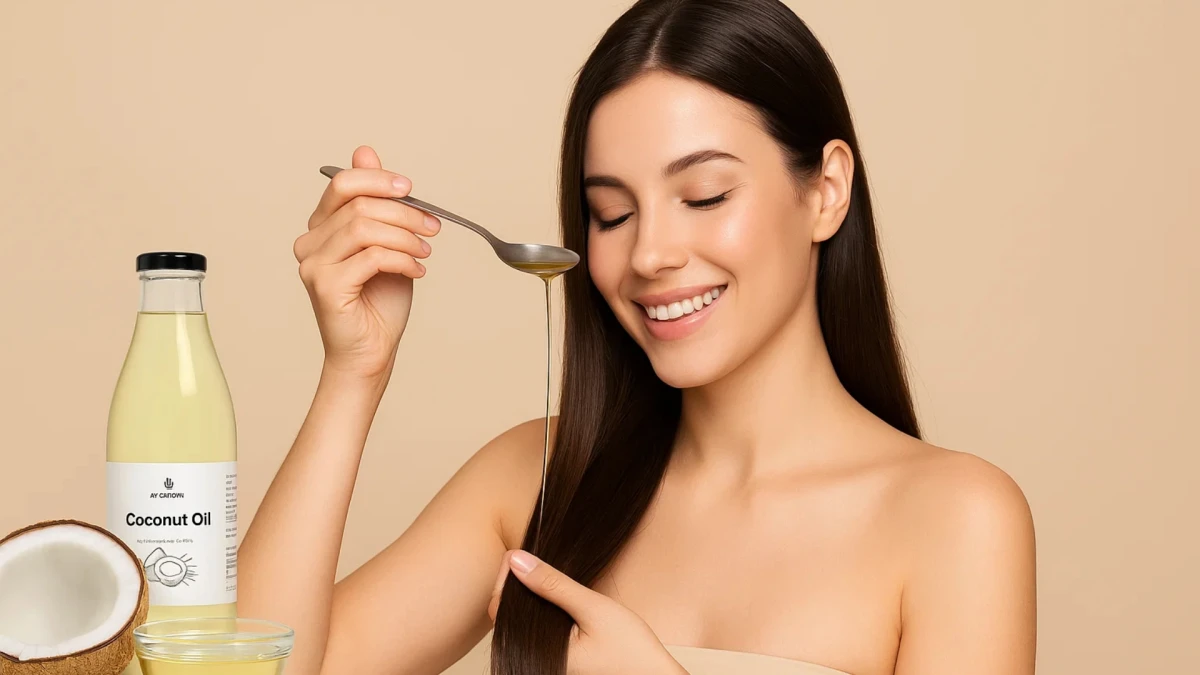
Coconut oil is perhaps the most researched hair oil, with studies showing its unique ability to penetrate the hair shaft and reduce protein loss. Its affordability and availability make it an excellent starting point for anyone new to hair oiling.
Key ingredients: The primary component is lauric acid, a medium-chain fatty acid with antimicrobial properties. Coconut oil also contains myristic acid, palmitic acid, and vitamin E.
How it works?
Coconut oil's molecular structure allows it to penetrate deeper into hair than most other oils, actually getting inside the hair shaft to strengthen it from within. This prevents protein loss that leads to weak, brittle hair. Its antimicrobial properties help maintain a healthy scalp environment.
How to use?
Warm solid coconut oil until liquid (it melts at about 76°F). Apply to scalp and hair, massaging gently. Leave for 30 minutes to several hours, then shampoo out. Can be used 1-3 times per week.
Pros:
Inexpensive and widely available, extensive research backing, pleasant scent, multifunctional
Cons:
Can be comedogenic (pore-clogging) for some people, solidifies at room temperature, may cause protein overload with overuse
Best for:
Damaged or chemically processed hair, those on a budget, people with thick or coarse hair
Price range: $5-15 for organic, unrefined coconut oil
3. Argan Oil - Best for Overall Hair Health
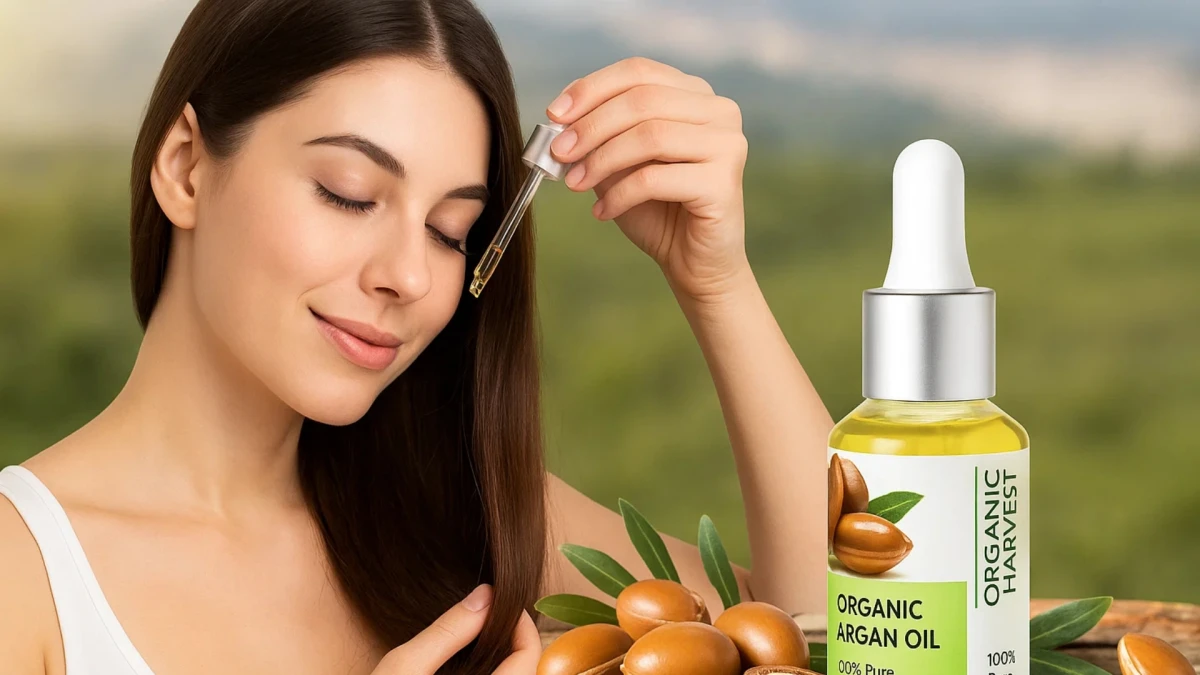
Often called "liquid gold," argan oil from Morocco offers comprehensive hair benefits that support both growth and overall hair health. Its unique composition makes it suitable for all hair types and particularly effective for damaged or chemically treated hair.
Key ingredients: Argan oil is packed with vitamin E, essential fatty acids (oleic, linoleic, and palmitic acids), and antioxidants including CoQ10 and melatonin. It also contains squalene, which helps maintain scalp health.
How it works?
The oil's molecular structure allows it to penetrate deep into the hair shaft, repairing damage from within. Its antioxidants protect against environmental stressors that can damage follicles and slow growth.
The oil also helps balance scalp oil production, creating optimal conditions for healthy hair growth.
How to use?
Argan oil can be used pure or mixed with other oils. Apply a small amount to damp or dry hair, focusing on mid-lengths to ends. For scalp treatment, massage a few drops into the scalp and leave for 30 minutes to overnight.
Pros:
Lightweight and non-greasy, suitable for daily use, provides UV protection, improves hair elasticity and shine
Cons:
More expensive than other oils, quality varies significantly between brands
Best for:
All hair types, especially dry, damaged, or color-treated hair; those wanting a versatile, daily-use oil
Price range: $15-40 for authentic, high-quality argan oil
2. Castor Oil - Best for Thickness and Strength
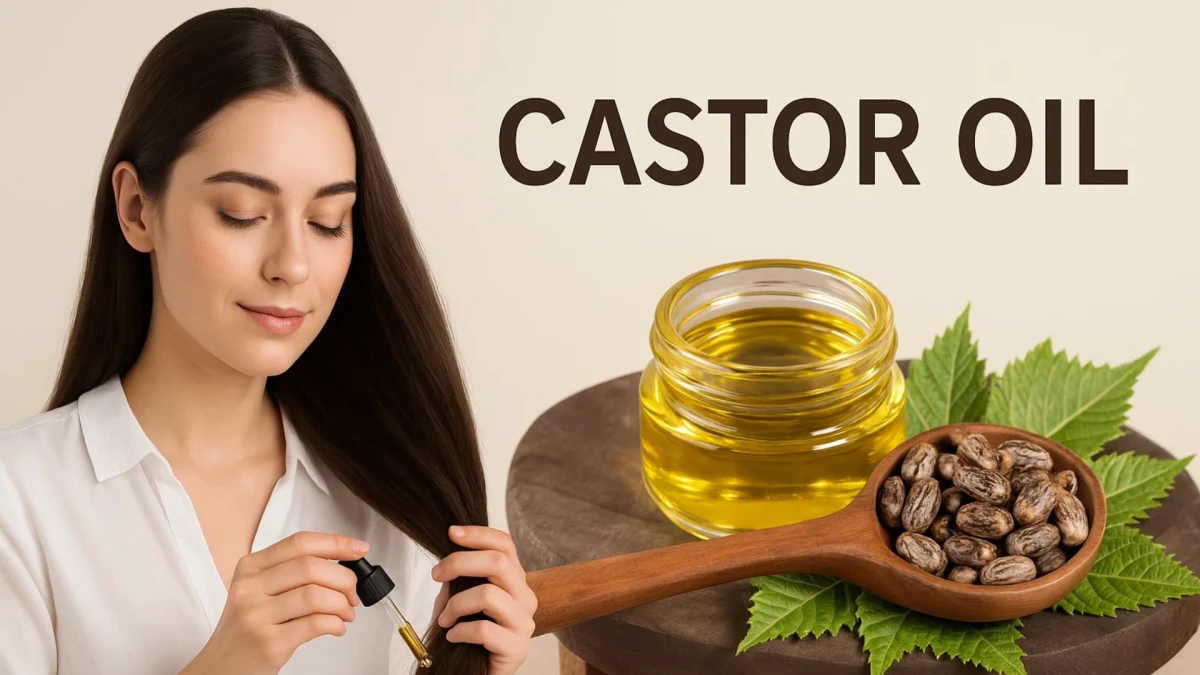
Castor oil has been a beauty secret for generations, particularly prized for its ability to create noticeably thicker, stronger hair. While scientific research is still catching up to anecdotal evidence, the oil's unique composition makes it particularly effective for adding body and preventing breakage.
Key ingredients: The star component is ricinoleic acid, a rare omega-9 fatty acid that makes up about 90% of castor oil. This compound has anti-inflammatory and antimicrobial properties. Castor oil is also rich in vitamin E, proteins, and other fatty acids that nourish hair.
How it works?
The thick consistency of castor oil coats hair strands, providing protection and moisture that prevents breakage. Its high molecular weight allows it to form a protective film around each strand.
The ricinoleic acid may help improve blood circulation to the scalp and has anti-inflammatory effects that create a healthier environment for growth.
How to use?
Castor oil is thick and sticky, so it's often mixed with lighter oils like coconut or jojoba in a 1:1 ratio. Apply to scalp and hair, focusing on ends. Leave on for 2-4 hours or overnight, then shampoo thoroughly (you may need to shampoo twice).
Pros:
Dramatic results for hair thickness and shine, long shelf life, multipurpose (also great for eyebrows and lashes)
Cons:
Very thick and difficult to wash out, can be messy to apply, strong earthy scent
Best for:
Those with fine or thinning hair wanting more volume, people with brittle or damaged hair
Price range: $8-20 for organic, cold-pressed castor oil
1. Rosemary Oil - Best for Stimulating Growth
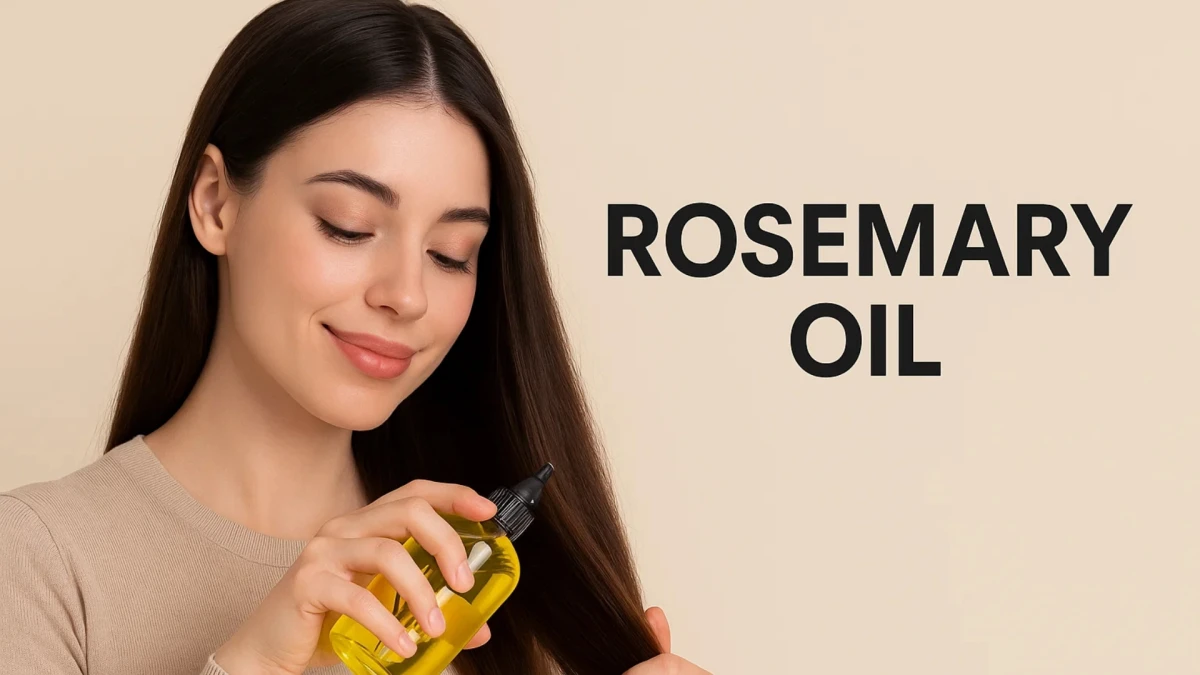
Rosemary oil has emerged as the star of hair growth oils, and for good reason. A landmark 2015 study found that rosemary oil was as effective as minoxidil (the active ingredient in Rogaine) for treating androgenetic alopecia, but with fewer side effects like scalp itching.
Key ingredients: Rosemary oil contains carnosic acid, which has been shown to heal nerve damage and improve circulation. It's also rich in antioxidants that protect hair follicles from environmental damage and premature aging.
How it works?
The oil stimulates blood circulation to the scalp, delivering more nutrients and oxygen to hair follicles. It also has anti-inflammatory properties that can help with conditions like dandruff that might impede healthy growth.
Some research suggests it may even help block DHT (dihydrotestosterone), the hormone responsible for pattern baldness.
How to use?
Mix 5-10 drops of rosemary essential oil with a carrier oil like jojoba or coconut oil. Massage into the scalp and leave for at least 30 minutes before washing out. For best results, use 2-3 times per week.
Pros:
Strong scientific backing, suitable for all hair types, relatively inexpensive, pleasant scent
Cons:
Must be diluted (never use pure essential oil on scalp), may cause irritation in sensitive individuals
Best for:
Anyone experiencing pattern baldness, slow growth, or wanting to prevent hair loss
Price range: $10-25 for a high-quality essential oil that will last months
Understanding Hair Growth and Thickness
Before diving into specific oils, it's important to understand how hair actually grows and what creates the appearance of thickness. Hair growth occurs in three phases: anagen (active growth), catagen (transition), and telogen (resting).
During the anagen phase, which lasts 2-7 years, hair follicles are actively producing new hair cells. The goal is to extend this phase and ensure follicles remain healthy and productive.
Hair oils support growth through several mechanisms. They nourish the scalp with essential nutrients, improve blood circulation when massaged in, and create an optimal environment for follicle health.
Many oils contain compounds that can penetrate the hair shaft, strengthening the structure from within and reducing breakage—which is crucial since what appears to be slow growth is often actually excessive breakage.
When it comes to thickness, it's important to distinguish between actual increase in hair density (more follicles producing hair) and the appearance of thicker hair.
While oils can't create new follicles, they can awaken dormant ones, strengthen existing strands to prevent thinning, and add volume and body that makes hair appear significantly fuller.
Key ingredients to look for include essential fatty acids that nourish follicles, antioxidants that protect against damage, and compounds like ricinoleic acid (in castor oil) or rosemary extract that have been shown to stimulate circulation and growth.
How to Use Hair Oils Effectively?
The key to success with hair oils lies in proper application and consistency. Start by choosing an oil that matches your primary concern—growth stimulation, thickness, or scalp health. Always perform a patch test before first use, especially with essential oils.
For scalp application, part your hair into sections and apply oil directly to the scalp using your fingertips or a dropper bottle. Massage gently in circular motions for 5-10 minutes to stimulate circulation.
This massage is crucial—it's often as important as the oil itself for promoting growth.
When applying to hair strands, focus on mid-lengths to ends rather than the roots, unless specifically treating the scalp. Use sparingly—a little goes a long way, and too much oil can weigh hair down and be difficult to wash out.
Timing matters too. For deep conditioning, leave oils on for several hours or overnight. For lighter treatment, 30 minutes is sufficient. Always use a gentle, sulfate-free shampoo to remove oils, and don't be afraid to shampoo twice if needed.
Common mistakes include using too much oil, not massaging the scalp, expecting overnight results, and using oils too frequently. Most oils should be used 1-3 times per week—daily use can sometimes lead to buildup or overwhelm the hair.
Additional Tips for Hair Growth
While oils are powerful tools, they work best as part of a comprehensive approach to hair health. Nutrition plays a crucial role—ensure you're getting adequate protein, iron, vitamins D and B12, and omega-3 fatty acids. Consider supplements like biotin or collagen if your diet is lacking.
Gentle hair handling is essential. Use wide-tooth combs on wet hair, avoid tight hairstyles that pull on the roots, and minimize heat styling. When you do use heat, always apply a protectant first.
Scalp massage, even without oils, can boost circulation and promote growth. Spend 5-10 minutes daily massaging your scalp with your fingertips. Some people find scalp massage tools helpful, but fingers work just as well.
Stress management is often overlooked but crucial—chronic stress can actually halt hair growth and cause excessive shedding. Regular exercise, adequate sleep, and stress-reduction techniques can significantly impact hair health.
Disclaimer:
The information provided in this article is for general informational purposes only and is not intended as medical advice. While the oils mentioned have shown potential benefits for hair growth and thickness, individual results may vary. Always consult with a healthcare professional or dermatologist before starting any new treatment or product, especially if you have sensitive skin, allergies, or underlying scalp conditions.





















































